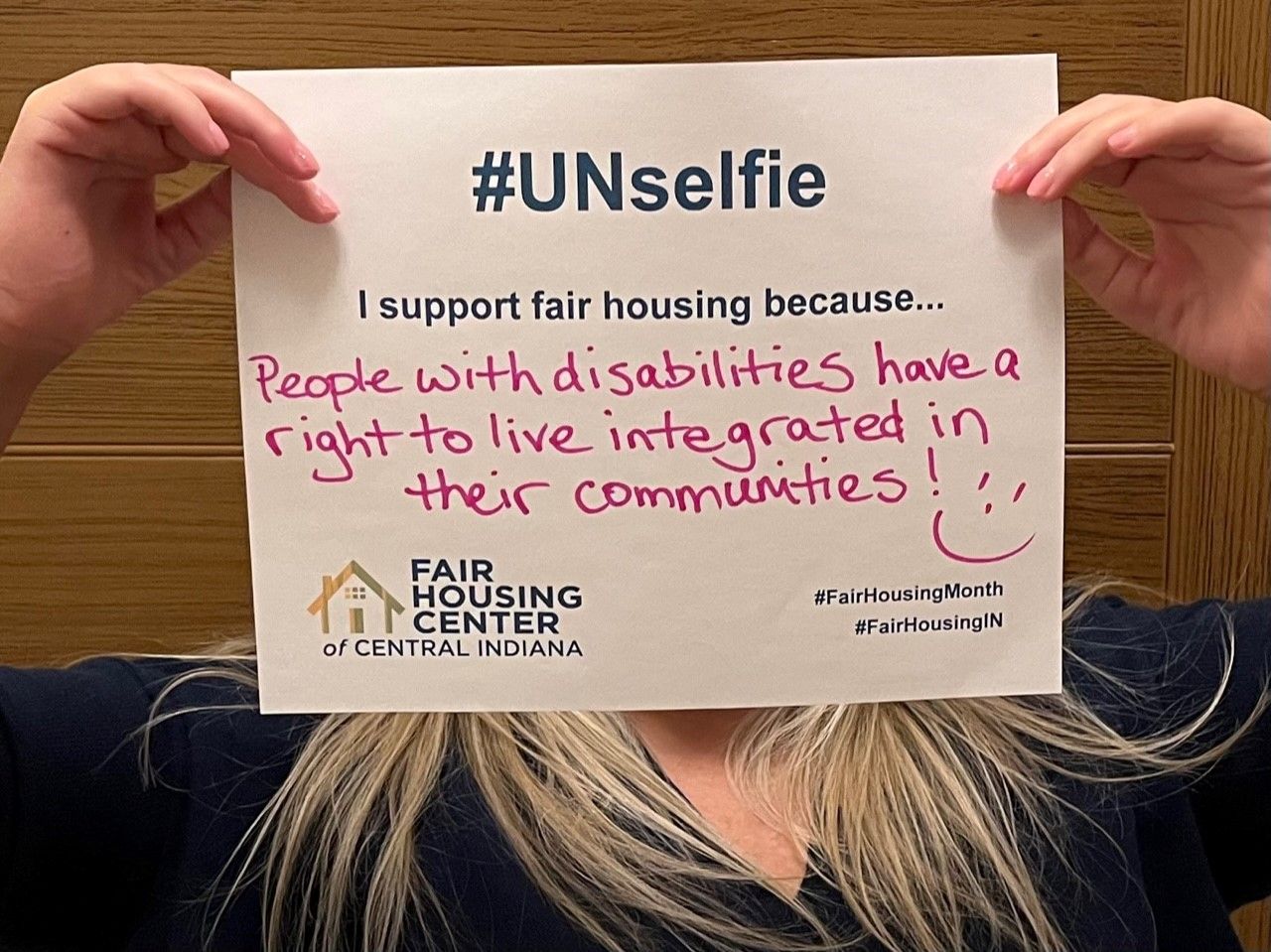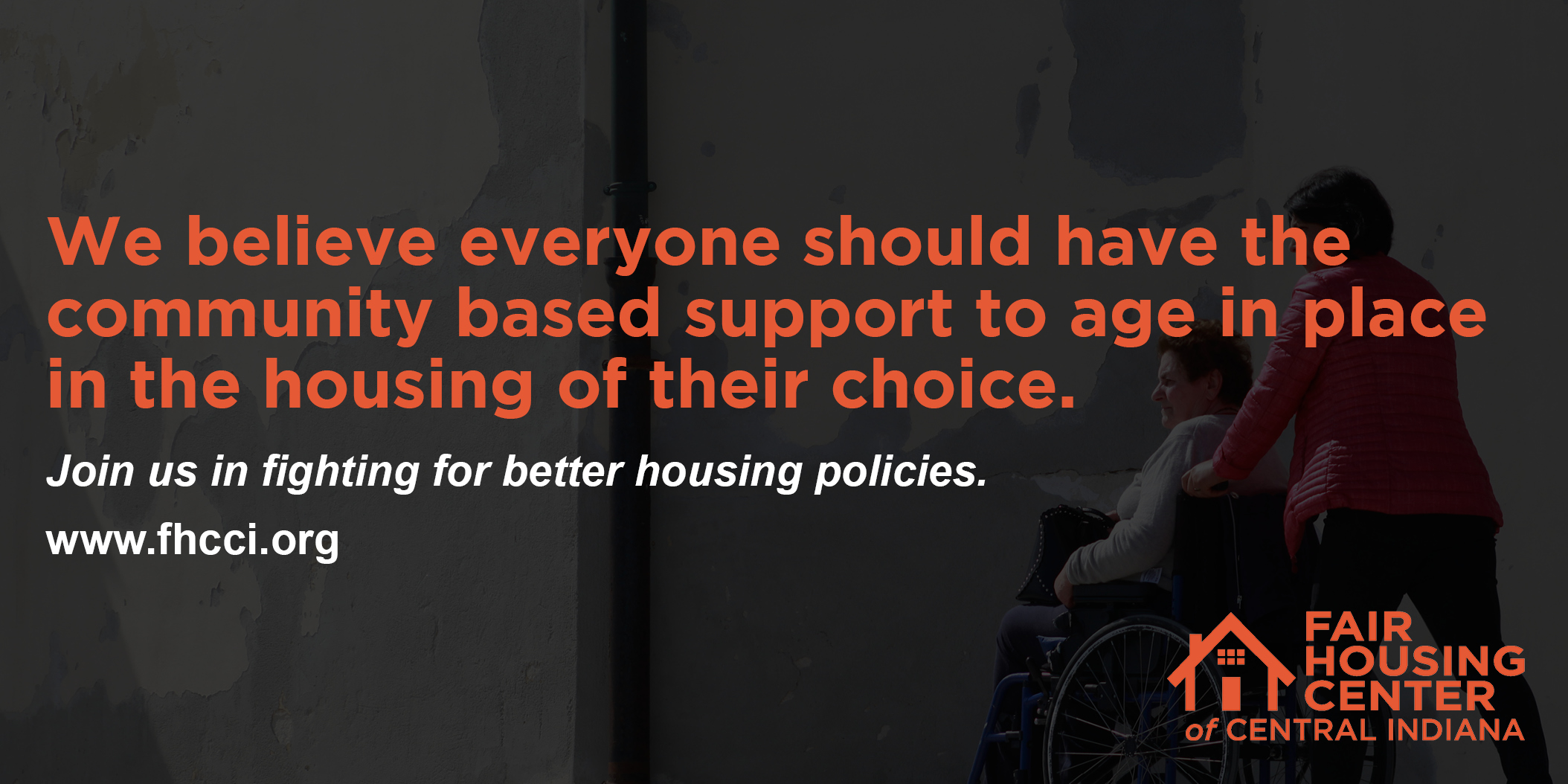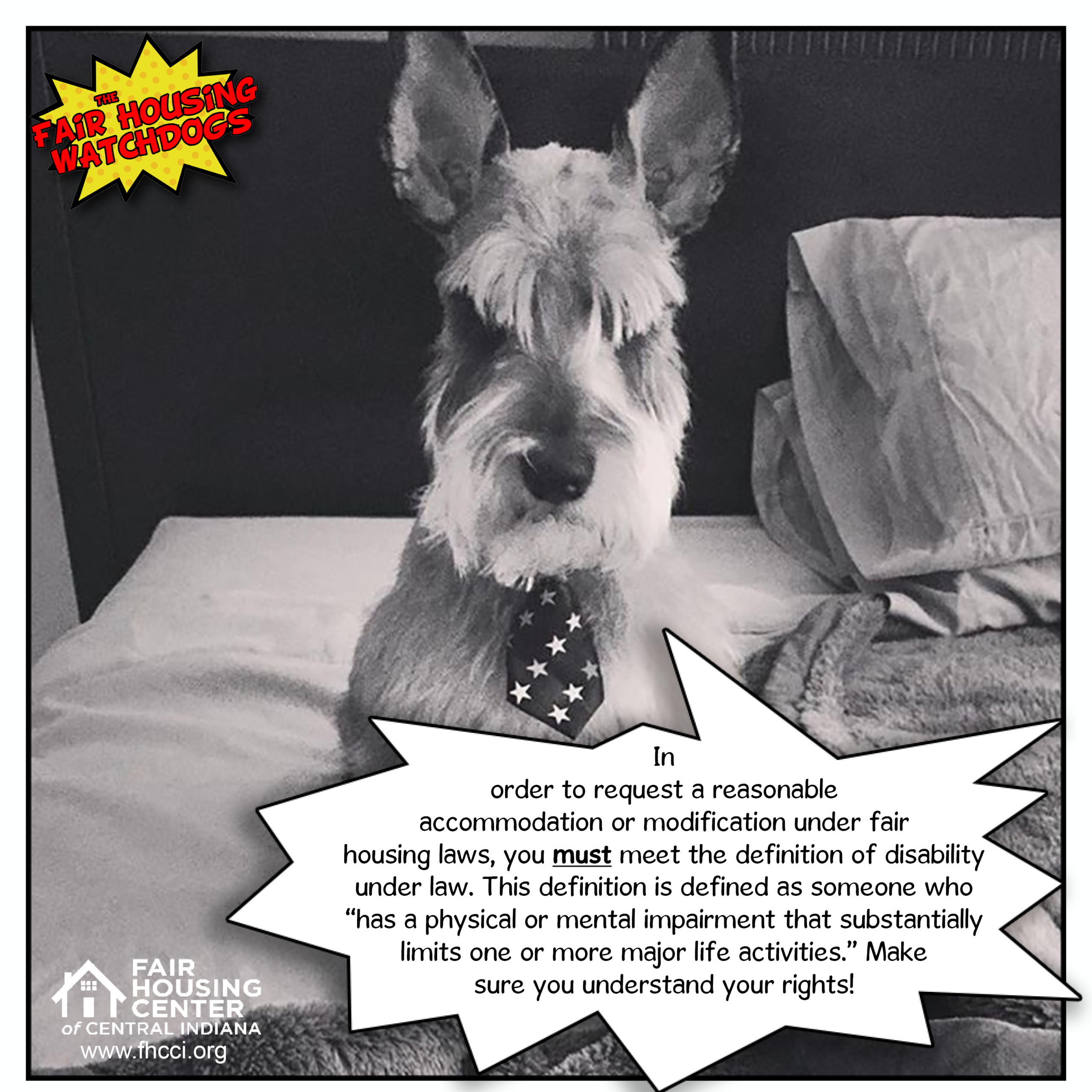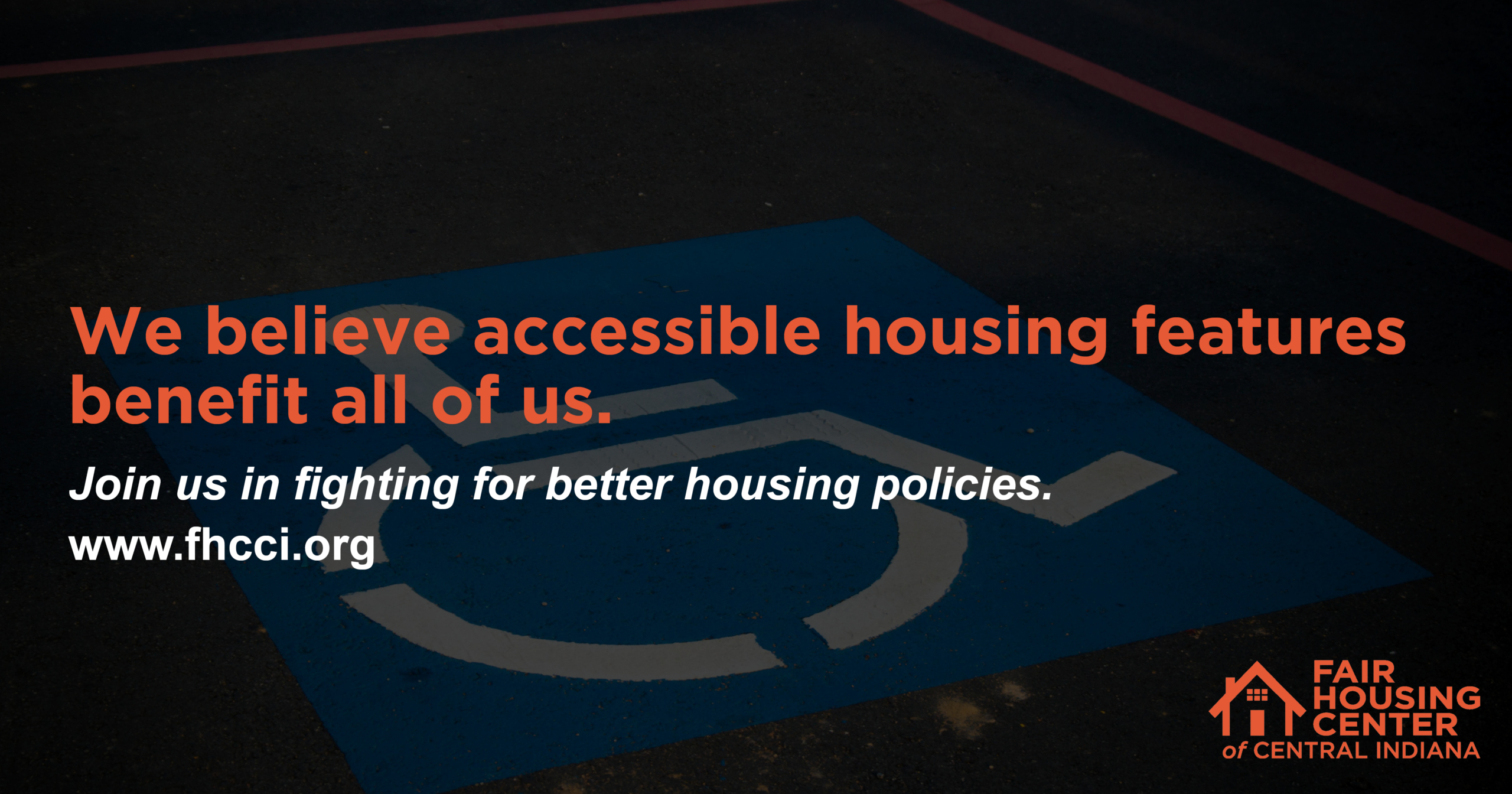Disability (Handicap)
On this page is an assortment of resources for persons with disabilities, their family members, or those who want to provide needed assistance. This page also has resources for housing providers to better inform those providers of their rights and responsibilities as well as best practices to facilitate open housing for all. This page includes requirements under fair housing laws as well as information on other housing related issues.
Federal fair housing laws define disability as an impairment that “substantially” limits a major life activity. Disability issues in fair housing typically fall into five primary categories: reasonable accommodations, reasonable modifications, service animals (a type of reasonable accommodation), accessibility, lending, and zoning (most often related to group homes). Although fair housing laws specifically reference “handicap,” we use the term disability whenever possible.
Disability based housing discrimination can take many forms including:
- Not allowing a reasonable accommodation in a “no pets” policy for someone who needs an animal for their disability and who meets the definition of disability under law.
- A lender mandating proof of long term disability benefits or asking for medical statements in order to approve a mortgage.
- Only providing information on first floor units to someone who is blind out of fear they may hurt themselves on stairs.
- A requirement for rental that an applicant must be “employed.”
- Requiring that someone using a wheelchair pay an extra deposit or get additional insurance coverage due to concern that they may damage the unit.
- A multi-family property built after March 13, 1991 that does not meet accessibility requirements.
- Making verbal statements such as “I don’t rent to bipolars” or “disabled people belong in a nursing home.”
- A requirement that a person with a disability must be able to live independently.
- Not allowing a person with a disability to make a reasonable modification – such as having ramp installed to get into their unit.
- A public housing authority refusing to provide a deaf interpreter or a housing provider refusing to rent to a deaf person who uses a relay service to communicate.
FHCCI Resources:
- FHCCI Brochure – Reasonable Accommodations and Modifications (English/Spanish)
- FHCCI Brochure – Protections for People with Disabilities and their Animals (English/Spanish)
- FHCCI Brochure – The Fair Housing Act’s Accessible Housing Requirements (English/Spanish)
- FHCCI Fact Sheet #4: Reasonable Accommodations and Modifications
- Fact Sheet #5: Animals in Housing for Persons with Disabilities
- Fact Sheet #6: Fair Housing Accessibility Requirements
- Fact Sheet #7: Visitability: Home Accessibility for Persons with Disabilities
- Fact Sheet #13: Fair Housing Rights of the Deaf and Hard of Hearing Communities
- FHCCI Guide to Reasonable Accommodations and Modifications
- FHCCI Fair Housing for Seniors in Indiana Guide
- FHCCI Animals as Accommodations Video
- FHCCI Design & Construction Accessibility Requirements Video
- FHCCI Disability/Fair Housing Video
Reasonable Accommodations and Modifications:
- FHCCI Resources:
- FHCCI Reasonable Accommodations and Modifications Fact Sheet
- FHCCI Guide to Reasonable Accommodations and Modifications
- Government Guidance & Resources:
- HUD-DOJ Joint Statement on Reasonable Accommodations Under the Fair Housing Act, May 17, 2004
- HUD-DOJ Joint Statement on Reasonable Modifications Under the Fair Housing Act, March 5, 2008
- HUD Guidance Memo on Insurance Coverage and Reasonable Accommodation, June 12, 2006
- HUD Guidance Memo on Requests for Exception Payment Standards for Person with Disabilities as a Reasonable Accommodation, May 13, 2025: Memo outlines when a person with a disability can make a request for a reasonable accommodation for an increased payment amount through the housing assistance program. (An example may include when it relates to the need for accessible housing and being unable to find within the fair market range.)
- Multiple Chemical Sensitivities, March 14, 1992: HUD Memo from March 14, 1992 on when a Multiple Chemical Sensitivity Disorder meets the definition of disability and would be protected under fair housing laws.
- General Information:
- Bazelon Center for Mental Health Law Fact Sheets: Bazelon has a number of fact sheets available on issues involving reasonable accommodations.
- Zoning – Rights to Reasonable Accommodations Under Zoning
Service, Assistive, Therapeutic, Emotional Support, and Companion Animals:
- FHCCI Resources:
- FHCCI Animals for Those with Disabilities Fact Sheet:
- FHCCI Guide on Animals for Those with Disabilities
- FHCCI Animals as Accommodations Video
- Government Guidance & Resources:
- HUD-DOJ Joint Statement on Reasonable Accommodations Under the Fair Housing Act, May 17, 2004
- HUD Rules on Pets in Elderly Housing, October 27, 2008 (includes discussion of service animals as well).
- HUD Memo on Insurance Policy Restrictions as a Defense for Denial of Reasonable Accommodations, June 12, 2006
- HUD Notice: Assessing a Person’s Request to Have an Animal as a Reasonable Accommodation Under the Fair Housing Act, January 28, 2020 (Rescinded September 17, 2025)
- HUD Fact Sheet on HUD’s Assistance Animal Notice, January 24, 2020 (Rescinded September 17, 2025)
- HUD Memo on Service/Assistive Animals, February 17, 2011
- HUD Memo on Assistance Animals, April 30, 2013 (Rescinded September 17, 2025)
- General Information:
- Bazelon Center, Right to Emotional Support Animals in “No Pet” Housing
- Animals and the Fair Housing Act: Great resource put together by Disability Rights North Carolina
Accessibility:
Multi-family properties built for first occupancy as of March 13, 1991 have to be accessible to people with disabilities under fair housing laws.
- FHCCI Resources:
- FHCCI Design & Construction Accessibility Requirements Video
- FHCCI Accessibility Fact Sheet:
- Government Guidance & Resources:
- Fair Housing Act Design Manual: Great HUD resource regarding accessibility requirements for multi-family properties built for first occupancy after March 13, 1991
- HUD-DOJ Joint Statement on Accessibility (Design and Construction) Requirements for Covered Multifamily Buildings Under the Fair Housing Act, May 1, 2013
- Fair Housing Act Design and Construction Requirements; Adoption of Additional Safe Harbors, December 8, 2020
- Studies of Interest:
- Census 2019 Study – How Accessible Are Our Homes?
- Accessibility of America’s Housing Stock: Analysis of the 2011 American Housing Survey (AHS), U.S. Department of Housing & Urban Development, May 25, 2015
- Discrimination Against Persons with Disabilities: Barriers at Every Step: 2005 study by the U.S. Department of Housing & Urban Development which showed that people with disabilities face discrimination in up to half of rental inquiries
- Shut Out, Priced Out and Segregated: The Need for Fair Housing for People with Disabilities, Metro Fair Housing Services, Inc., August 2011
- Century 21’s Persons with Disabilities Home Buying Survey, July 2015
Visitability:
Movement to make single family homes “visitable” by those with disabilities or mobility limits.
- FHCCI Resources:
- General Information:
- Concrete Change: Valuable resource for information on visitability, state and local ordinances and other info
- National Council on Independent Living: Visitability resource page.
Lending:
Olmstead and Community Based Care Issues:
- Government Guidance & Resources:
- Reports of Interest:
- The Unfulfilled Promise of Olmstead, Bazelon Center for Mental Health Law, 2009
- Raising Expectations: A State Scorecard on Long-Term Services and Supports for Older Adults, People with Physical Disabilities, and Family Caregivers, AARP 2014
Using People First Language:
- What Not To Do – Using People First Language
- The Power of Words: A Guide to Interacting with People with Disabilities, Indiana Governor’s Council for People with Disabilities
- Guidelines for Writing About People With Disabilities, ADA Network
General Disability Reports of Interest:
- Discrimination Against Persons with Disabilities: Barriers at Every Step: 2005 study by the U.S. Department of Housing & Urban Development which showed that people with disabilities face discrimination in up to half of rental inquiries
- Shut Out, Priced Out and Segregated: The Need for Fair Housing for People with Disabilities, Metro Fair Housing Services, Inc., August 2011
- Are You Listening Now? A National Investigation Uncovers Housing Discrimination Against the Deaf and Hard of Hearing, National Fair Housing Alliance, December 2013
- Rental Housing Discrimination on the Basis of Mental Disabilities: Results of Pilot Testing, 2017 study by the U.S. Department of Housing & Urban Development that shows that persons living with mental illness, intellectual, or other developmental disabilities continue to face significant housing discrimination in the rental housing market
- The State of Disabled LGBTQI+ People in 2024, Center for American Progress, July 15, 2025
Zoning and Group Homes:
- Zoning and Group Homes: Joint Statement of the DOJ and HUD on Group Homes, Local Land Use and the Fair Housing Act, August 18, 1999
- FHCCI Fact Sheet 14 – Ensuring Fair and Affordable Housing Through Zoning
Watch the FHCCI’s short video on “Reasonable Accommodations for Animals Under Fair Housing Laws.”
Hear from our client, Sarah, about her experience when confronting discrimination due to a disability.
In this FHCCI video, you will learn about the “Fair Housing Design & Construction Accessibility Requirements” for multi-family properties.
In this 2022 WISH-TV news story, learn about one of the FHCCI’s enforcement actions to ensure accessible housing for persons with disabilities. News link here.
The independent living movement organized to demand an end to segregation for Americans with disabilities, who were denied basic rights, like attending schools, holding jobs, or choosing homes. This led to a major milestone with the U.S. Supreme Court’s Olmstead decision. Learn about this key decision in this short video.









